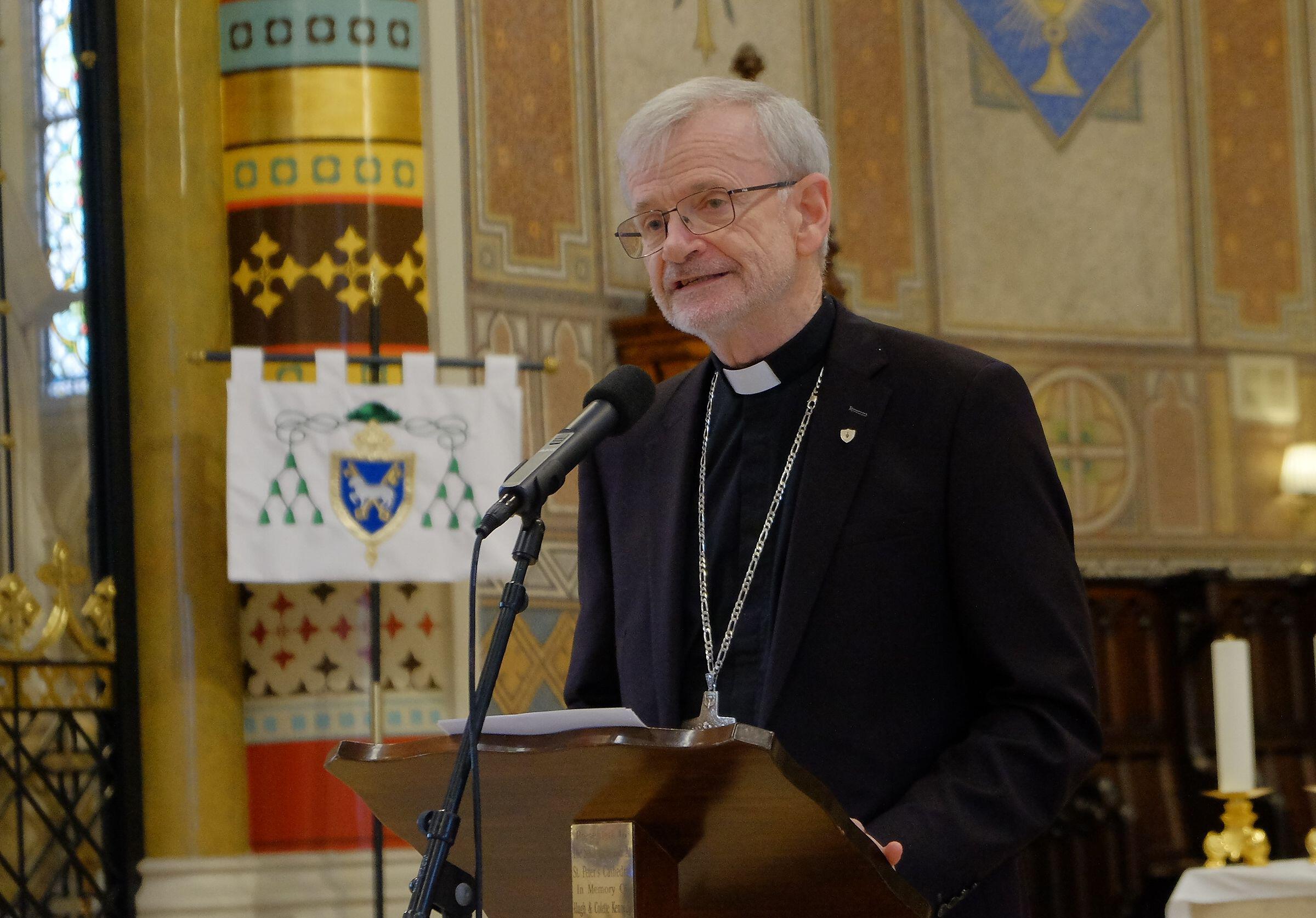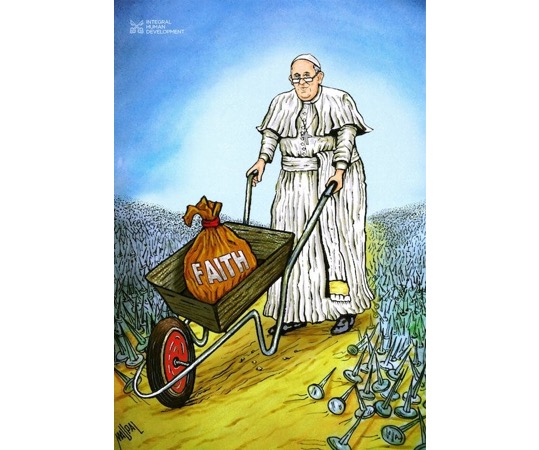The Democratic Republic of Congo is still suffering the effects of extreme floods, after the past three months saw the worst overflows of the Congo River in 60 years. Caritas Congo has recorded at least 400 deaths and 686,000 people displaced in eight of the country’s 26 provinces.
Last month, Pope Francis prayed for those affected by the exceptionally heavy rainfall. Caritas is working with other agencies to provide food, water, sanitation, shelter and medical care.
“People are living in the water…we don’t really know how it’s going to end. There’s a lot of damage and houses are collapsing,” said Fr Louis Iyeli, who heads a local Caritas group. “Apart from the houses, there are churches, schools and health centres…there’s no way for people to continue working or selling,” he added.
Around 1,325 schools and 259 health centres have been put out of action by the floods. The Jesuit Refugee Service said last week that there were already millions of displaced people in DR Congo after more than two decades of conflict.
Cardinal Michael Czerny, prefect of the Vatican Dicastery for Integral Human Development, began an eight-day pastoral visit to South Sudan this week marking the first anniversary of Pope Francis’s visit.
The cardinal said that the country’s elections later this year must be “credible and peaceful”. In a homily in Juba last Sunday, Czerny told the congregation it was “a critical moment in the political life of your country”, noting that elections are scheduled for December after repeated delays.
He called for all parties to adhere to the Revitalised Agreement on the Resolution of Conflict in South Sudan, signed in September 2018, which provides a framework for ending the civil war begun in December 2013, when President Salva Kiir accused his vice-president Riek Machar of plotting a coup.
Czerny was due to celebrate Mass in St Josephine Bakhita parish, Malakal, on 8 February for the World Day of Prayer and Reflection against Human Trafficking, and to travel to Renk, on the Sudan border, to bless a boat used by the local Caritas office to transport migrants along the Nile.
Pope Francis has appointed Mgr Janusz Stanislaw Urbanczyk the new apostolic nuncio to Zimbabwe amid growing concern about human rights abuses and economic hardship in the country.
Mgr Urbanczyk assumed his posting in January, taking over from Archbishop Paolo Rudelli who left Harare last August after being appointed nuncio to Colombia. The new Polish-born nuncio has represented the Vatican in other roles in Kenya, Bolivia, New Zealand, the United Nations and Slovakia.
His appointment comes as Zimbabwe’s Catholic bishops have voiced growing concerns about the deteriorating human rights conditions, with government critics regularly detained. In his previous posting as the Holy See’s permanent observer to the Organisation for Security and Cooperation in Europe, Mgr Urbanczyk was noted for his statements on human rights.
The apostolic nuncio to Turkey Archbishop Marek Solczynski celebrated a Mass of reparation in the “desecrated” church of the Nativity of Our Lady in Büyükdere, Istanbul, where a man was murdered by two terrorists on 28 January.
Islamic State claimed responsibility for the attack which killed Tuncer Murat Cihan, a 52-year-old Alevi Muslim who had attended Sunday Mass there in the months before.
“A new altar will be consecrated and prayers offered for the soul of the late Tuncer Cihan, murdered in those horrible circumstances,” said a statement from the Apostolic Vicariate of Istanbul, ahead of the Mass on 1 February.
Bishop Massimiliano Palinuro, the apostolic vicar of Istanbul who concelebrated the Mass, attended Cihan’s funeral at a cemevi, an Alevi place of worship, on 29 January. “He was like a pure angel. He lost his life for the community there,” Palinuro said at the funeral, according to Turkish news outlet BirGün.
The Vatican will publish the Pope’s Sunday Angelus message and Wednesday audience catechesis in Mongolian.
Cardinal Giorgio Marengo, the apostolic prefect of Ulaanbaatar, described the move as “a new tool at the service of evangelisation”.
He told Vatican Radio that written material in Mongolian was now available on the Vatican News portal but that in future “there could also be audio production”. He added: “We are working on synergy models with the local Churches.”
Plans to make Mongolian the 52nd language available on Vatican media began during the Pope’s visit to Mongolia last September.
Catholic religious congregations in South Korea have called for action to tackle a decline in vocations, blaming secularisation for the decrease. This is in response to the Statistics of the Catholic Church in Korea 2022 report, which revealed that religious vocations have halved over the past 10 years and there has been a decline in the presence of religious sisters in parishes.
The congregations urge more diocesan involvement to increase vocations, noting the efforts of the vocations office of the Diocese of Suwon which works in collaboration with 15 religious orders to help prospective candidates discern their vocation.
The Archdiocese of Seoul has begun preparations to host World Youth Day 2027, convening a 40-strong research team to lay the groundwork for the event. It includes clergy, religious, and laity, particularly “dynamic young minds” from within the archdiocese.
A Chilean nun who has devoted her life to serving female prisoners is a co-winner of the 2024 Zayed Award for Human Fraternity.
Sr Nelly León Correa, who belongs to the Congregation of Our Lady of Charity of the Good Shepherd, spent 18 months during the Covid pandemic living in a female prison in the Chilean capital Santiago. In 2009, she founded the charity Mujer, Levántate (“Woman, get up!”) which aims to help women after their release from prison.
The award, also given this year to the Egyptian cardiac surgeon Sir Magdi Yacoub, celebrates the document on human fraternity co-signed in February 2019 by Pope Francis and Ahmed Mohamed Ahmed El-Tayeb, the Grand Imam of Al-Azhar.
The University of Notre Dame in Indiana announced a new anti-poverty initiative after receiving a gift of $100 million from an alumni couple.
“Notre Dame’s Catholic mission gives a distinctive orientation to all we do, including our research, and nothing reflects that mission more powerfully than the Poverty Initiative, which will study and combat the causes and consequences of poverty,” said the university’s president Fr John Jenkins CSC, announcing the initiative.
The money will be used to fund research, to “turn evidence into action, illuminating proven pathways out of poverty for people around the world”, and to prepare students for careers in anti-poverty programs.
This comes at a time when the US bishops’ principal anti-poverty program, the Catholic Campaign for Human Development, has had to cut its grants because annual collections have not returned to pre-pandemic levels.
The Latin Mass Society of Arlington, Virginia held a pre-Vatican II Mass in a conference room in the US Capitol building without having permission from the Archbishop of Washington, Cardinal Wilton Gregory.
The group said it marked the first anniversary of the leak of an FBI memo which warned that white nationalists were working to infiltrate “radical traditionalist” Catholic groups. It was repudiated by FBI Director Christopher Wray and Attorney General Merrick Garland.
A spokesperson for the archdiocese said it “was not asked for permission to hold a Traditional Latin Mass outside of the three designated Archdiocese of Washington churches where this Mass is regularly celebrated, in keeping with Pope Francis’ guidance in Traditionis Custodes.”
The organisers told The Pillar news site, which first reported the story, that they did not seek permission because “the concern was that Cardinal Gregory calls the Speaker’s office and cancels the thing on us”.
As the Utah legislature considers introducing mandatory reporting of sex abuse of a child, Bishop Oscar Solis of Salt Lake City has called for “all the Church faithful to talk to their respective representatives, give them a call, send a letter or email and make them aware of the centrality of the Seal of the Confessional to our faith”.
Solis said the goal of the legislation was “laudatory” and that the Church has implemented strict guidelines to safeguard children.
“This year the Utah legislature again is considering legislation that would allow clergy members, including Catholic priests, to report to law enforcement ongoing abuse or neglect even if this information is gained during a confession,” Solis wrote in a letter dated 2 February.
“When similar bills were proposed in 2020 and again last year, I asked all parishioners in our diocese to help defend our religious rights and oppose that bill.
“This year is a little different. We do not oppose the proposed legislation, as initially written, but we are concerned about the possibility that the language could be changed to require that Catholic priests report such abuse even if they have learned about the abuse solely during the Sacrament of Confession.”
A 76-year-old retired priest in Florida and his 69-year-old sister were killed by a gunman last week.
A neighbour of Fr Robert Hoeffner reported that the priest had offered counselling to the killer, 24-year-old Brandon Kapas, who shot Fr Hoeffner and his sister Sally at their home in Palm Bay. Kapas stole their vehicle, after loading it with firearms, and travelled to a family gathering where he shot and killed his grandfather.
After injuring two policemen, Kapas – who is also believed to have attended a weekly Bible study group at Fr Hoeffner’s home – was shot dead by police.
France’s National Assembly voted on 30 January to add the right to abortion to the constitution, in reaction to the repeal of the right in the United States in 2022 and tight limits on abortion in countries such as Poland. The bill passed by 493 votes for and 30 against in its first reading and is likely to pass into law.
Abortion has been legal in France since 1975 and support is strong among parties and voters. However, the bill will need to find consensus with the more conservative second chamber, the Senate, which blocked a bill two years ago to protect a “right” of women to an abortion. A constitutional amendment must also win a three-fifths majority in a referendum or a joint session of parliament.
This bill says “the law determines the conditions by which is exercised the freedom of women to have recourse to an abortion, which is guaranteed”. Abortion is permitted in France in the first 14 weeks and later if two doctors attest to grave dangers to mother or foetus.
Girls and boys aged 6-12 will meet Pope Francis on 25 May, the first World Children’s Day. Organised by the Dicastery for Culture and Education, the event originated in a suggestion made to the Pope by 9-year-old Alessandro during a podcast released just before World Youth Day in July 2023.
Last November, the Pope met 7,500 children from across the world at the Vatican. Cardinal José Tolentino de Mendonça, prefect of the Dicastery for Culture and Education said: “The Holy Father wishes to meet with boys and girls to hear the Gospel which during this early season of life vibrates inside them.”
The Pope’s Lenten Message for 2024, released on 1 February with the title “Through the Desert God Leads us to Freedom”, echoes the themes of the social encyclicals Laudato Si’ and Fratelli Tutti. He calls for “conversion” and urges attention to social justice, a review of personal lifestyles, care for creation, and aid for the poor and marginalised.
“Today, the cry of so many of our oppressed brothers and sisters rises to heaven. Let us ask ourselves: Do we hear that cry? Does it trouble us? Does it move us?...Love of God and love of neighbour are one love.”
The Vatican asked Italian street artist Maupal, famous for his creative depictions of Pope Francis, to illustrate the message with weekly posters during Lent. The first depicts Francis pushing a wheelbarrow carrying a bag labelled “Faith”, journeying through a desert littered with nails.



 Loading ...
Loading ...